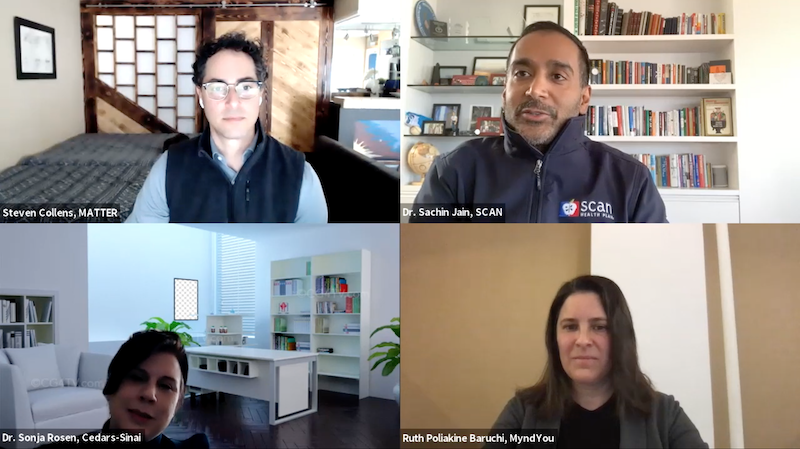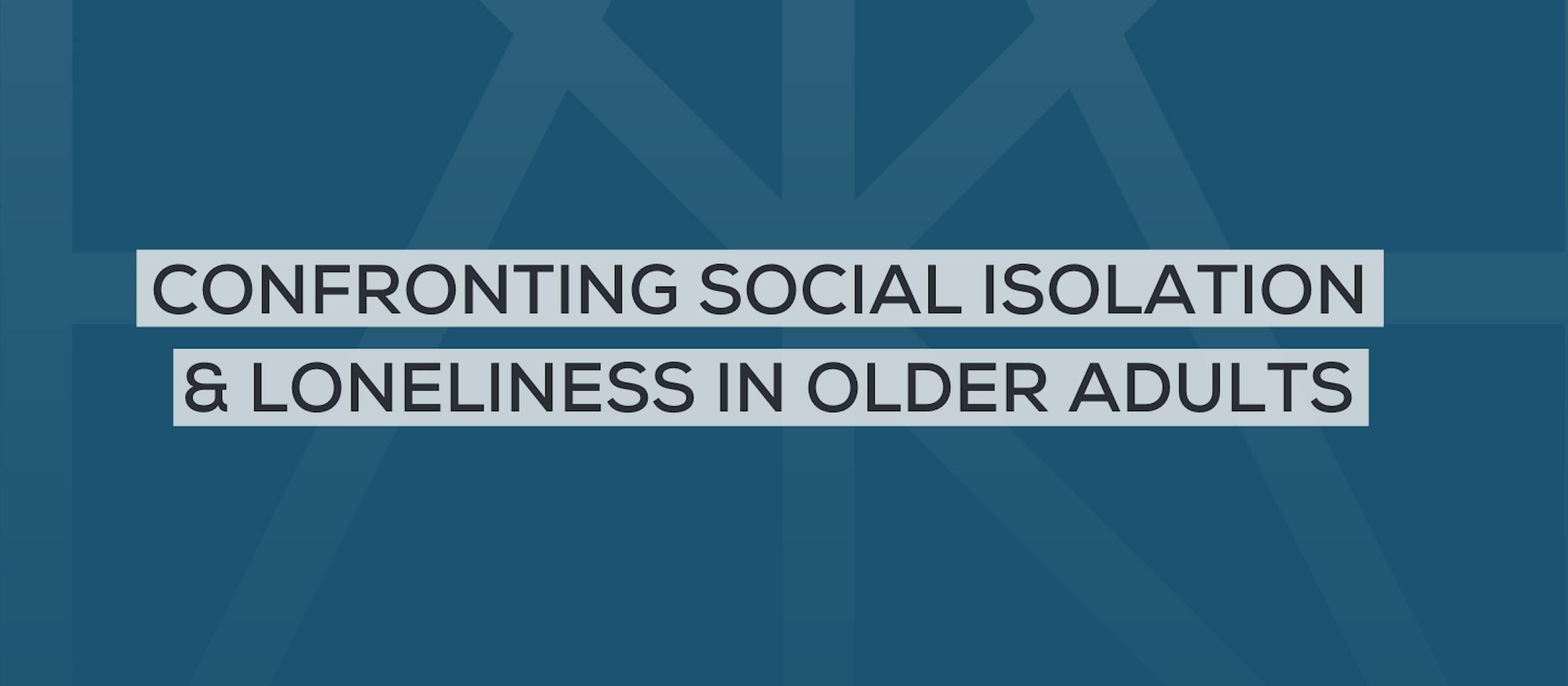Confronting social isolation and loneliness in older adults
Loneliness and social isolation have long been serious public health risks. The CDC estimates that at least one in four adults aged 65 and older are socially isolated, which correlates with an increased risk for chronic disease, stroke, anxiety, depression, dementia and premature death. All of these issues are exacerbated, given the need for us to remain physically distant in the time of the COVID-19 pandemic.
To unpack these challenges, SCAN Group CEO and President Dr. Sachin Jain, Cedars-Sinai Chief of Geriatrics Dr. Sonja Rosen and MyndYou CEO and Co-Founder Ruth Poliakine Baruchi joined MATTER CEO Steven Collens to discuss the issues of social isolation and loneliness, the strain it creates on older adults and the healthcare system at large, and approaches to help payers and providers manage an aging and increasingly isolated population of patients.
Watch the full event here.
Following are our key takeaways from the event. Responses have been edited slightly for length and clarity.
Social isolation and the impacts on health outcomes
Sachin: “If you’re a clinician seeing patients you see loneliness every single day — and you see it in people of all ages and manifesting in different forms. One of the things that you also see is the profound effect that loneliness has on the spiritual and physical health of the patients we have the privilege of caring for. To connect, to join with other humans, is what really what being human is all about.
“When we see people who, for whatever reason, find themselves socially isolated and unable to connect, we want to do something for them. For years, when we would see patients who were socially isolated we would have nothing to offer them. One of the exciting things that’s happened over the last number of years is that there have been a number of us who have tried to work to build interventions so that, just in the same way that you can prescribe a medicine when somebody has diabetes, you’re able to prescribe an intervention when a person is suffering from loneliness and social isolation.
“We know that people who are socially isolated or lonely are admitted and readmitted to the hospital more, and ultimately participate in preventative healthcare screenings with lower frequency. In simple terms, they participate in self care less. I think we have an opportunity as a healthcare industry to take this issue on. At the same time, I think there’s a tendency and a risk to over-medicalize everything. Social isolation and loneliness in older adults is a problem that’s going to require the engagement of the healthcare community, but our plates are already pretty full. It’s also going to require a new social contract for all Americans, particularly as we enter this new phase of our country’s history, where we commit to each other more, we’re participating more and actually engaging with each other more.”
Social isolation and loneliness in older adults is a problem that’s going to require the engagement of the healthcare community…it’s also going to require a new social contract for all Americans. - Sachin Jain, SCAN Group
Sonja: “Lonely individuals are less likely to exercise, remember to take their medication, engage with or even see their physician or eat well. There are a lot of layers to the reasons why a person who is socially isolated might also be facing other challenges like financial, housing or food insecurity. These factors are all really critical to their wellbeing. A perfect example of that is a person who doesn’t have the ability to get to a senior center where they can get a warm meal. They may also not have the ability to get to their physician or get to the grocery store readily.
There’s this really clear overlap. It is our responsibility as clinicians to take into account all of these social factors. If our patients can’t be well-nourished, if they can’t access the medications we prescribed them, if they can’t participate in the exercise class we recommended, then we aren’t really helping them get better. It’s critical that we recognize social isolation as a medical problem and utilize evidence-based programs to help get our patients socially connected.”
Utilizing technology to provide a human touch
Ruth: “When we began designing the MyndYou solution, what we had in mind — and really where I see technology bringing value and impact to seniors and our society as a whole — is bringing better awareness to the needs of our seniors who are socially isolated and lonely, or who suffer from different diseases that are not always known or identified. Based on the conversations that we’re having with our customers, health plans and providers need help triaging members who are socially isolated or lonely in order to help them. Technology doesn’t replace family members or care managers, but it can make it easier for them to reach the people who need the most help and to do that faster and more efficiently.
“Where our solution and other solutions bring value is really in the ability to identify change in a scalable way. Our solution, MyEleanor, is an AI-powered voice assistant that facilitates meaningful conversations with seniors and listens for both verbal and non-verbal cues, alerting care managers when it detects medical or behavioral health changes or issues affecting social determinants of health, such as loneliness and social isolation.
“I’ll give an example to show how MyEleanor works. One of our client’s members recently lost his wife, who was also his main caregiver. In his conversation with Eleanor, he told her that he didn’t have any friends, that he spent his days staring at his four walls. ‘What a boring life,’ he told her. MyEleanor alerted the plan’s care management team that he was feeling isolated and depressed and they intervened to connect him with community services. The technology can also share information like the number for the health plan’s mental health services hotline. A few days later, the man ended his next call with Eleanor in a more optimistic way, thanking her for calling him. This is one example of how we can all become more aware of what’s going on in an actionable, scalable and human way to provide better care and services to seniors who are isolated and lonely.”

Steven Collens, Dr. Sachin Jain, Dr. Sonja Rosen and Ruth Poliakine in conversation during the live virtual event on January 21.
Social isolation and loneliness are solvable issues
Sachin: ”Evidence-based programs to help curb social isolation and loneliness in older adults are plentiful. The one thing that I want to point out about all of these programs is that this isn’t rocket science. Most of these programs are really low tech — it’s people getting on the phone and calling people or people going to visit others. There’s no IP here, it’s pretty open source. Again, it goes back to this question of where is the will going to come from? Ultimately, these are solvable problems. If I wanted to go address my elderly neighbor’s loneliness tomorrow, there would be nothing stopping me. The question becomes, ‘How do we become a better society where checking in on our older adults is part of who we are?’. How can we leverage both high-tech solutions like MyndYou’s and low-tech solutions, like just checking up on your neighbor? Our doctors and nurses will feel their burdens lessen the more we do this. Clinicians have a tendency to take way too much on in the exam room — they’ve got a long list of issues to address, and loneliness is one of them.”
How can we best alleviate the burden that socially isolated older adults face?
Ruth: “People need to have the opportunity to communicate, and they need someone to give them this opportunity in a way that works for them. The way MyndYou delivers technology in a human, natural, seamless and respectful way, provides the opportunity for people to connect, to ask for help or to participate in something that is not a part of their typical routine, thus improving their wellbeing and health.”
Sonja: “This is part of our job. We need to be captain of our ship in caring for our patients. We don’t have all the answers and we can’t do it all ourselves. But we can’t delegate this work to someone else. We have to recognize the importance of social isolation and other social determinants of health. It’s just as important as diabetes and hypertension, if not more important. Our raising awareness among ourselves and our colleagues is really critical.”
Sachin: “Pick someone in your life, anyone who you think needs a little bit more love, and give it to them. Then, encourage someone else to do the same.”
Nothing can replace community and family
Sachin: “Health professionals are a self-flagellating bunch. We take responsibility for a lot of things, many of which we should take responsibility for, and others that we still take responsibility for even though there are other contributing factors. What I can say definitively is that the number one solution to addressing loneliness in our society is stronger families and stronger communities. While I do believe that medical professionals are powerful in their capabilities, we aren’t necessarily always able to help people create stronger families and stronger communities.
What I can say definitely is that the number one solution to addressing loneliness in our society is stronger families and stronger communities. - Sachin Jain, SCAN Group
“I think that this dialogue always needs multiple tracks. There’s the track around identifying lonely patients in the exam room and doing what we can as medical professionals and as a healthcare industry to help them. At the same time, we can’t ignore the fact that we need a better approach as a society from a public policy and social structure perspective to aging and community engagement so that people don’t feel quite as socially isolated and we care more about our neighbors and grandparents.
“There’s a number of companies that have emerged to have so-called ‘grandkids on demand’. What about people’s own grandkids? We can’t commercialize every single social problem that we have into a solution. I commend everyone who is working on building solutions, but the real thing that we need to do is call and visit our grandparents more — there’s no substitute for that. We have to make sure we’re having an authentic dialogue about this as we’re working to build solutions that we can deliver through the exam room and other vehicles.
“This problem is getting a lot of attention right now because books and articles have been written as we’ve all experienced the social isolation that comes with the COVID-19 pandemic. The topic is top of mind, but the intellectual history of this problem is extensive. I happened to be a student of Robert Putnam in 2001 when he published Bowling Alone, a book which documented the significant decline in social capital in the United States between 1960 to 2001. The reality is, as a society we’ve started to fray; where we once made community number one, many of us have made the individual number one. I think we need to take a big step back and recognize that there are untoward effects and side effects that we all experience from a society where the individual takes precedence over community and family. I believe very strongly that this is not just a medical problem, but rather a broader problem that our society needs to solve.”



